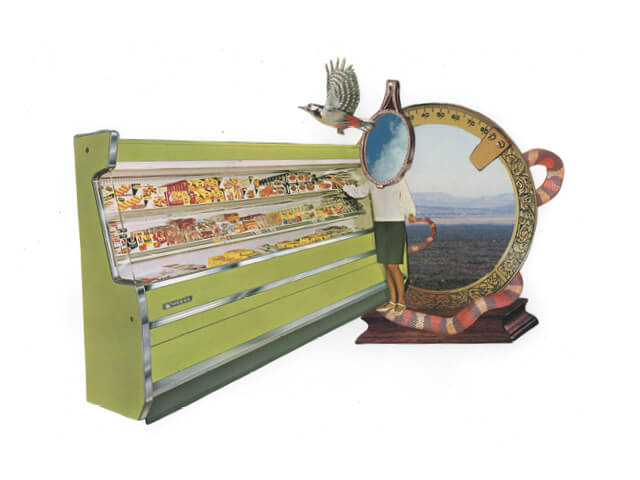The Questionable Ethics of Ethical Shopping

Collages by Jay Riggio
Within the space of a square mile in Brooklyn—from the Fulton Mall to Court Street in Cobble Hill—it’s possible to shop for both $2 T-shirts and $2,000 handbags, and to eat anything from a dollar slice to a $90 platter of seafood. This is the consumer’s paradise to which we’ve grown accustomed in the last few decades, a place where the availability of discount goods has increased in seemingly direct correspondence with the proliferation of luxury items. And this reality makes its own perverse sense; we live in a city of extreme inequality, so why wouldn’t this be reflected in the things we buy? And much in the same way that American wealth and poverty have been inextricably linked to morality—“good” has become a code word for “expensive” when referencing everything from schools to snack food—our shopping habits have come under scrutiny in recent years with the introduction of the concept of the ethical shopper.
As anyone who has stepped inside a grocery store in the past twenty years knows, the simple act of buying a quart of milk or a dozen eggs is now weighted with a new sense of responsibility. Rather than simply buying whatever’s the best value, we look for signifiers that the food we’re about to purchase is ethically sourced, that the milk comes from cows that are free of hormones and antibiotics (or, even, that the “milk” itself is actually cow-free, and instead comes from nuts or soy) or that the eggs come from chickens that live a cage-free existence. These added features increase the cost of whatever it is we’re buying, but when the base price is already low and the differential between the “good” and the “bad” food is just a few dollars more, it’s pretty easy and still relatively cheap to do the ethical thing. Sure, buying from the farmer’s market versus Key Food adds up, but it’s an acceptable tax because of how much better it can make us feel about ourselves and, like, the world.
And then there’s fashion. Even though there’s never been more clothing options available for the consumer, now more than ever, each dollar spent on fast fashion comes with the reminder that those cheap clothes are only priced so low because they are made using sweatshop labor in factories with horrific environmental records. So what’s the ethical shopper—the person who would never dream of buying factory-farmed poultry—to do when it comes to buying factory-made dresses? How can ethical shopping extend into the fashion world?


Well, let’s get this part out of the way first: There is no such thing as ethical shopping. The only purely moral manner of consumption has nothing to do with propping up and perpetuating the existing state of the fashion world, and would instead consist of only buying secondhand clothes. But where’s the fun—or even the likelihood—in abstaining from fashion completely? Just as most of us will buy groceries rather than grow our own tomatoes, we’re also going to wind up shopping for clothes at some point. But in the same way ethical food comes at a premium, so does ethical shopping, rendering it impossible for many to even consider buying ethically sourced clothes. This is a problem, because how “ethical” can ethical shopping be when it’s prohibitive to a huge percentage of consumers?
Not very! In fact, the whole premise of ethical shopping is an illusion, a marketing ploy to entice people with large amounts of disposable income and a desire to do some good in this world (or at least feel something like goodness while taking action that is personally beneficial) to spend their money on the fashion version of organic kale. But in the same way buying organic food doesn’t mean there will be immediate, corresponding change in the hourly wages of migrant farm workers, buying locally made clothes doesn’t mean sweatshop labor will suddenly end. Simply because a few people can afford to spend massive amounts of money on clothes, doesn’t mean that the vast majority won’t continue to buy discount sweaters. Because although it would fit nicely into New York’s ultra-capitalist narrative, we—as a society—will not be able to buy salvation.
Instead, we can forget about ethical shopping as a way toward consumer enlightenment, and focus on advocating for the type of systemic changes made at a legislative, contractual level which will improve labor and environmental conditions in the clothing industry. That—not buying $200 organic cotton sweatpants—would be the truly ethical thing to do, and is a change that everyone, no matter their income, could make.
Follow Kristin Iversen on twitter @kmiversen
You might also like 



















